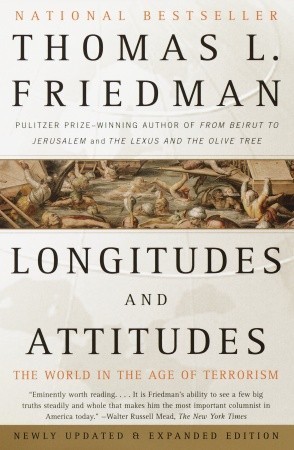What do you think?
Rate this book


399 pages, Paperback
First published September 11, 2002
Published in 2002, this volume of columns by Thomas Friedman from before and after the September 11th attacks might be no more than an exercise in the unnerving clarity of hindsight appended by some excellent foreign policy advice and observations. In this regard alone, Longitudes and Attitudes is a captivating piece; Friedman, of course, is an exceptional writer, and his experience with Middle Eastern affairs is unmatched.
Now, more than ten years after the publishing of this book, readers of Longitudes and Attitudes may enjoy the work with enough detachment to understand it as a historical and anthropological study. When it came out, Longitudes and Attitudes shocked readers by demonstrating the the signs the September 11th attacks were in plain sight through columns published by Friedman before the attacks, and, in the columns included written after the attacks, provided expert commentary on what the U.S. should do next. The columns included in this work are now firmly in the past, but the Middle East continues its slide into instability. Thus, Friedman's remarkable prescience in the columns written after 9/11 make this a book of not one "I told you so," but two.
In short, Longitudes and Attitudes is, more than anything else, a story of the road not taken.